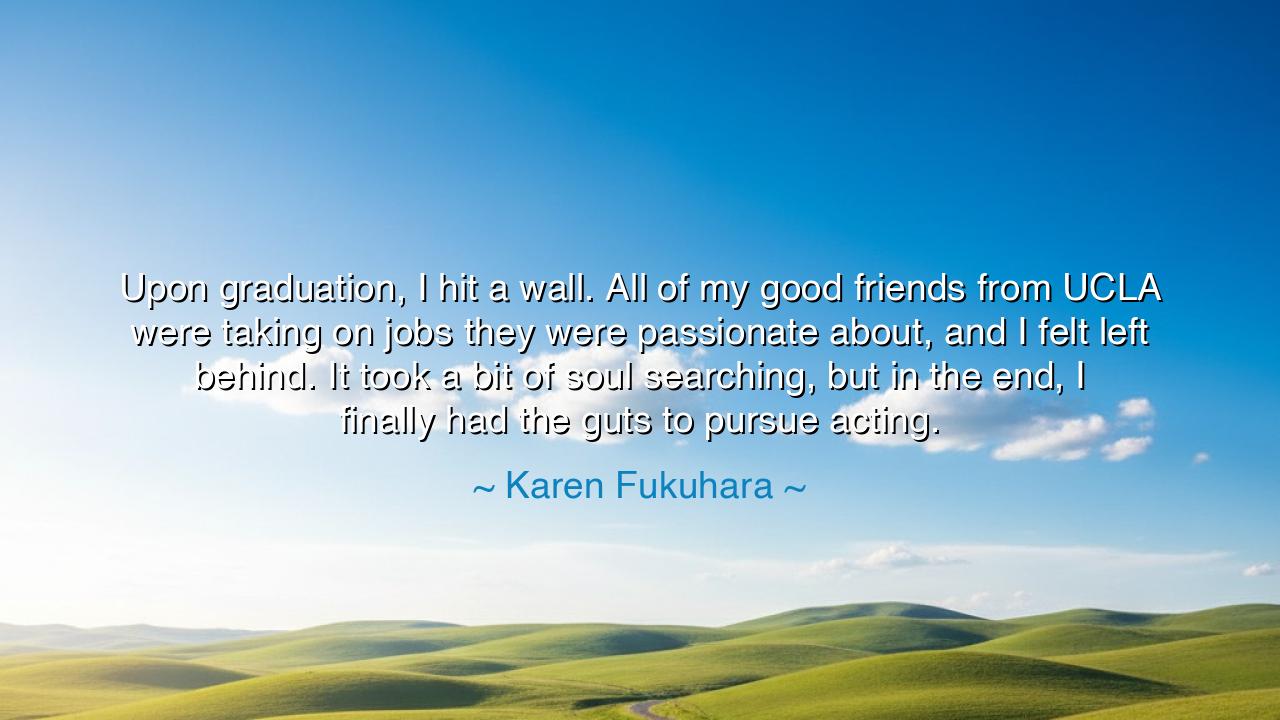
Upon graduation, I hit a wall. All of my good friends from UCLA
Upon graduation, I hit a wall. All of my good friends from UCLA were taking on jobs they were passionate about, and I felt left behind. It took a bit of soul searching, but in the end, I finally had the guts to pursue acting.






The actress Karen Fukuhara, known for her grace, strength, and quiet determination, once said: “Upon graduation, I hit a wall. All of my good friends from UCLA were taking on jobs they were passionate about, and I felt left behind. It took a bit of soul searching, but in the end, I finally had the guts to pursue acting.” Beneath these humble words lies a universal story — the moment when a soul stands at the crossroads of expectation and truth. Her quote speaks not only of career and ambition but of identity, courage, and the struggle to find one’s own path in a world that moves faster than the heart can follow.
To “hit a wall” is an ancient metaphor, one that every seeker in history has known. It is that point in the journey when effort meets uncertainty, when the path ahead seems blocked and one’s inner compass falters. After graduation, Fukuhara — like so many of her generation — looked around and saw others surging forward, confident and assured, while she stood still, burdened by doubt. Yet it is often in these moments of stillness and confusion that life begins to whisper its deepest truths. The wall is not a punishment; it is a teacher, a sacred pause that asks: Who are you, truly? What do you desire beyond imitation?
Her words recall the journeys of those who, too, once stood lost at the threshold of their destinies. Consider J.K. Rowling, who after finishing her studies in Classics, found herself adrift — jobless, struggling, and uncertain of her place in the world. Like Fukuhara, she faced that same wall, feeling left behind while others thrived. But in that silence, the spark of a story — of a young boy with a lightning scar — was born. It was not comfort that awakened her gift, but emptiness. And so it is with Fukuhara: in the space between doubt and courage, her true calling — acting — revealed itself.
When Fukuhara speaks of “soul searching”, she invokes one of the oldest acts of wisdom. It is the turning inward — away from noise, away from comparison — to listen to the quiet voice that dwells beneath fear. This inner pilgrimage is the most difficult of all journeys, for it requires honesty without excuses. Many live their entire lives without undertaking it, mistaking busyness for purpose. Yet she, in her youth, found the strength to question herself and the guts to pursue what her spirit longed for. This is what the ancients would have called the rebirth of vocation — the moment when knowledge becomes wisdom and direction is born from reflection.
There is a sacred humility in her confession of feeling “left behind.” In a society obsessed with speed and success, to admit slowness is to stand apart. But Fukuhara’s story teaches that being behind is not failure — it is alignment. The flower that blooms last does not bloom less beautifully; it simply waits for its own season. Many of history’s brightest lights — from Vincent van Gogh to Albert Einstein — began their true work only after years of obscurity and uncertainty. Time, for the soul, does not move by calendars but by readiness.
The lesson, then, is both tender and timeless: do not fear the wall. When life halts your stride, when the path you planned begins to crumble, know that this is not the end of your journey but its unveiling. Allow yourself to feel lost, for loss is the soil in which clarity grows. Look inward, not outward. Trust that the spark within you — however faint — is enough to light your way forward. And when you hear its call, have the courage, as Karen Fukuhara did, to follow it with both humility and daring.
And so, let her words endure as a lamp for those who wander: “It took a bit of soul searching, but in the end, I finally had the guts to pursue acting.” For every heart that feels left behind, this is the truth — that you are not late, only preparing. The wall that stands before you is not meant to stop you, but to strengthen you. When you climb it, you do not merely find a career; you find yourself. And from that place of authenticity, every step forward becomes sacred, every act a testimony to the courage it takes to live one’s truth.






AAdministratorAdministrator
Welcome, honored guests. Please leave a comment, we will respond soon